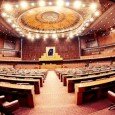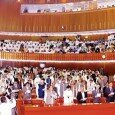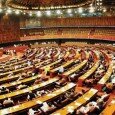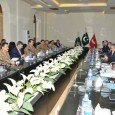By Ahmed Bilal Mehboob –
An assessment of the 13th national assembly
The current national assembly, which is the 13th national legislature of Pakistan, completed its 4th year of the 5-years term on 16th March 2012. With this, the present National assembly became the 4th national legislature of the country which could cross the 4th year mark in the 65-year history of Pakistan. The first legislature, the Constituent Assembly, existed for a record period of 7 years and 2 months until the Governor General of the time took the highly contentious decision to dissolve it on 24th October 1954. The next was the 5th National Assembly which could last for 4 years and 9 months. The assembly which had begun its life on 14thApril 1972 was dissolved by the then Prime Minister Zulfikar Ali Bhautto on 10thJanuary 1977 to hold fresh election.
The 12th National Assembly has the distinction of completing its full 5 year term which lasted from 16th November 2002 to 15th November 2007. The distinction of completing 4 years by the present national assembly may itself be an important landmark in the turbulent parliamentary history of the country but more important is the question about the performance of the popular chamber of the national parliament during the past 4 years.
A quick review of the performance during the past 4 years and its comparison with some of the previous legislatures reveals a mixed record of performance of the 13th National Assembly. To begin with, let us look at the record of legislation or law making, the primary responsibility of the national assembly. It is true that a legislature cannot be held solely responsible for its performance on legislation because in a parliamentary system it is the government and its parliamentary party which has the major responsibility of introducing and pursuing the bills and successfully passing these as acts of parliament.
However, legislation is one of the most important indicators of the performance of any legislature. The present national assembly has passed 95 bills during the past 4 years which, on average, translates into 24 bills per year. Compared to this, the previous national assembly had passed 50 bills in its 5 year term which translates into just 10 bills per year. The present assembly has, therefore, passed about two and a half times or 140 percent more laws than the previous assembly. However, if we compare the legislative performance of the National Assembly of Pakistan with the Indian Lok Sabha, a different picture emerges.
On average, Indian Lok Sabhas have passed 49 bills per year during the past 12 years. This is twice the number of bills passed on average by the current national assembly. The legislative performance of the present national assembly and the parliament as a whole has improved not only quantitatively over the previous assembly, but also the present parliament has passed some landmark legislation. the 18th constitutional amendment that amended almost one third of the entire constitution was unanimously passed by the national assembly. This amendment restored all those powers of the parliament which were taken away by the president under military-controlled governments under the 8th and then 17thconstitutional amendments.
In addition, the amendment granted much greater quantum of provincial autonomy than ever expected by smaller provinces. The same amendment brought in significant electoral reforms by granting much greater independence to the Election Commission and providing for the appointment of members of the Election Commission and the Chief Election Commissioner through a bipartisan parliamentary process.
The assembly also passed the landmark 20th constitutional amendment under which the process of appointment of the caretaker government during election was also made bipartisan. In addition, a number of pro-women bills were passed by the assembly. But the most significant failure of the present assembly on the legislative front is its inability to pass the National Accountability Commission bill which remains stuck with the Standing Committee on Law, Justice and Parliamentary Affairs for the last 3 years.
The current national assembly of Pakistan met for a total of 552 days during the past 4 years which means that the assembly completed on average 138 days per year against the constitutional requirement of minimum 130 days per year. This means that the present national assembly exceeded the constitutional requirement of the minimum number of days of sittings. Since 2-day break during a parliamentary session is also counted towards the number of days which the assembly is constitutionally required to meet, number of actual working days turns out to be 105 days per year on average and this indicates a welcome 36 percent increase from 77 average actual working days during the previous (12th) National Assembly.
The parliamentary committees are one of the most important features of any parliament. There are 42 Standing Committees presently working in the national assembly. Public Accounts Committee (PAC) is generally considered the most important of all the committees. Present national assembly and the present government can rightly take pride in pioneering the tradition of appointing leader of the opposition or his nominee as chairman of this important committee.
Another healthy tradition was established by allowing more than one fourth of the committees to elect chairpersons from the opposition parties. The PAC in the present Assembly has demonstrated an exemplary performance not only by rising above party considerations and developing a consensus when reviewing the audit reports up to year 2008, but also by working really hard in pursuing various objections raised by the Auditor General of Pakistan. Rigorous follow-up of irregularities committed in the National Logistics Cell (NLC) and allegations against some retired senior military officers who were serving in the NLC was a landmark achievement of the PAC.
Unfortunately, the excellent performance and the bipartisan consensus could not last beyond three and a half year as the PAC chairman, who is also the Leader of the Opposition in the National Assembly, resigned sensing that the ruling party was not going to maintain the same spirit of consensus when the review of audit reports for the period of the present government was to start. The chairman PAC also protested against the appointment of the Audito General whom the opposition regarded totally unsuitable for this important assignment. The PAC remains dysfunctional since the resignation of its chairman some 4 months ago. It will be a pity if such a critical institution of the parliament is rendered dysfunctional indefinitely.
The Parliamentary Committee on Constitutional Reforms (PCCR) which prepared the draft of the 18th and 19th constitutional amendments and the Parliamentary Committee on National Security (PCNS) both performed extremely well in the present parliament. Both the committees are joint committees of the Senate and National Assembly and both are headed by Senator Raza Rabbani.
A great deal of credit for the admirable performance goes to Senator Raza Rabbani’s leadership and hard work. The PCNS has recently created history by undertaking one of the most in-depth review of Pakistan’s security and related foreign policy in the backdrop of deteriorating relations with the USA after their attack on Pakistan Army’s post near the Afghan border and killing of 24 Pakistani soldiers.
Currently, the parliament is debating the guidelines presented by the PCNS on relations with the US and foreign policy in general. Unfortunately, some of the other important standing committees of the national assembly could not match this performance. Most notable disappointing performance was that of the National Assembly Standing Committee on Foreign Relations which simply failed to take notice of some of the most significant foreign policy reversals experienced by Pakistan and failed even to meet at the time of crises. Another important committee is the Standing Committee on Defence whose deliberations have generally skirted around the most crucial issues of national defense and focused mostly on the affairs of PIA.
But probably the most important deficiency of the national assembly and its committee system has been reflected in the largely ineffective and superficial budget process. Committees in national assembly have no role in reviewing or commenting on the national budget. The budget debate lasts for merely 10 days on average and passing of the budget is largely a formality.
Indian parliamentary budget process, in contrast, lasts for 75 days and its committees undertake a detailed review of the budget. Lok Sabha budget debate is mainly guided by the reports submitted by the parliamentary committees relevant to each ministry. The parliamentary budget process in Pakistan is in need of urgent reforms. Will the present government and the ruling coalition be able to introduce such reforms in the budget process as it had introduced in the political and electoral fields through the 18th , 19th and 20th constitutional amendments.
Luckily, the national assembly will only need to amend the National Assembly Rules of Procedure and Conduct of Business by simple majority if it is willing to introduce these long over-due reforms. There is room for optimism as there are news that the National Assembly’s Committee on Rules and Privileges, headed by Nadeem Afzal Chan of PPP, has already passed an amendment to the Assembly Rules to this effect. One should hope that the assembly takes up and passes this amendment in time to take effect before the presentation of this year’s budget.
Despite many weaknesses and the need for reforms, the current national assembly has demonstrated a significant improvement in its performance compared to the previous assembly.
The significance of these improvements may not be realized immediately and the case for many more reforms is certainly strong but signs of improved performance of the national assembly certainly point to a better quality of democracy in the days to come.
Author is the Executive Director of the Pakistan Institute of Legislative Development And Transparency – PILDAT (www.pildat.org) and can be reached at [email protected]































































































